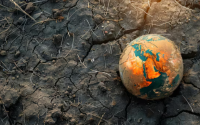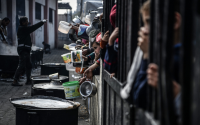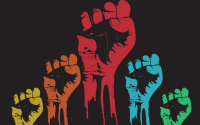25 December 2006Chron.comBetsy Blaney
Rancher John Welch sees barren pastureland everywhere these days, forcing him to consider his least desirable option.
"We're going to have to start to sell cows if we don't get some rain," said Welch, who manages up to 10,000 head of cattle on Spade Ranches across West Texas.
"That's the factory," he said, referring to his calf-producing mother cows. "You hate to sell the factory."
Texans are about to bid farewell to a dry, hot year that had the nation's No. 2 agriculture state reeling from its worst single-year losses for crops and livestock. The drought, now in about its 20th month, also sparked deadly wildfires and dropped lake levels to their lowest point for this time of year since 1978.
As much as 20 percent of the state remains in exceptional drought and a similar percentage is enduring extreme drought, Texas Cooperative Extension drought specialist Travis Miller said.
The forecast through April could improve conditions. A weak to moderate El Nino weather pattern shows increased chances for above normal rainfall statewide.
The first 11 months of 2006 rank as the 31st driest January-through-November stretch since 1895. Average rainfall for that period was 23 inches, down from the normal level of 26.02 inches, the National Weather Service said. Compounding the lack of rainfall is a statewide average temperature of 68.9 degrees, the second warmest January through November on record.
"You put those together and it's not good," NWS meteorologist Victor Murphy said.
Those conditions have also taken a toll on Texas' lakes. Statewide, levels fell 1 percent from October to November and are down 7 percent from a year ago, according to the latest Texas Water Development Board report.
The drought cost the state — the nation's leading producer of cotton and cattle — $2.5 billion in lost crops and $1.6 billion in livestock losses.
The cotton crop, coming off a record 8.5-million-bale harvest in 2005, was projected to be down 32 percent for 2006. Most of the drop resulted from 2.2 million acres of dryland cotton that never grew.
About three-fourths of the state's hay crop didn't make it, forcing cattle ranchers to pay more for what remained or pay higher prices for hay delivered from outside the state.
In addition, more than 21,000 fires burned about 2 million acres in Texas from January through early November, according to the Texas Forest Service. More than half of that acreage was in the Panhandle, where 12 people died and ranchers lost 5,000 miles of fence and 5,000 cattle in March wildfires.
Texas sent more cattle to auction in the late spring and summer than in 2005 because of the drought, Texas Department of Agriculture spokeswoman Beverly Boyd said. Lack of forage and hay prompted producers to cull their herds to cut losses.
"It's very difficult to feed out of a drought," Texas and Southwestern Cattle Raisers Association president C.R. "Dick" Sherron said. "A lot of old timers will tell you it's impossible."
In September, about 24,000 Texas producers in 216 drought-stressed counties became eligible for $16.1 million from the federal Livestock Assistance Grant Program.
"It's truly a tough situation for a large number of our ag producers," Miller said. "There are people who are going to lose their businesses if they don't get some kind of relief."
Part of that relief could come in the form of more federal disaster assistance. The U.S. House and the Senate decided earlier this month to send an unfinished budget to next year's Democratic-controlled Congress.
U.S. Sen. Kay Bailey Hutchison, R-Texas, recently told Texas Farm Bureau members she had "every confidence" the disaster assistance would materialize.
"It's been our top legislative priority for some time now," farm bureau spokesman Gene Hall said. "We hope Congress comes through with that as soon as possible after the new Congress convenes."
But farmers and ranchers know money won't solve all their problems.
"There's no substitute for a good rain," Hall said. "We're, along with everyone else, on our knees praying for that."






